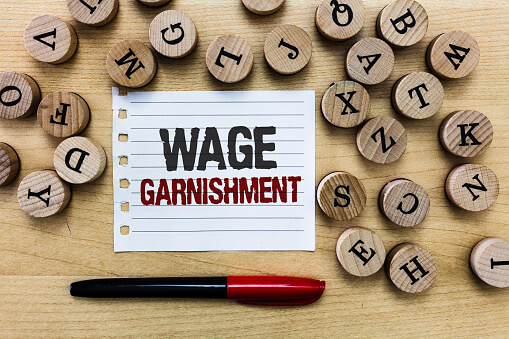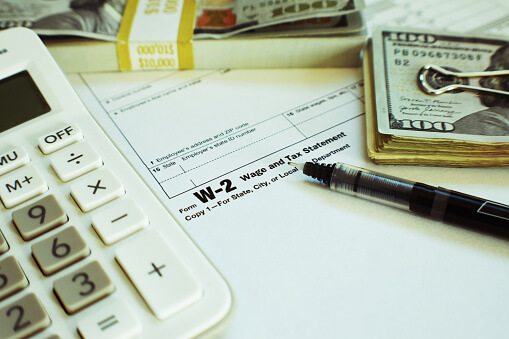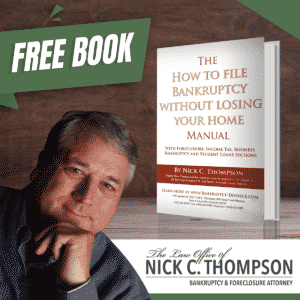Most people asking this question have had a bank garnishment, or wage garnishment order hit their employer. You usually know about the creditor and the lawsuit. If you ignore them you will find about 25% of your after-tax wages garnished. You may get no notice, and suddenly your boss advises you human resources has a wage withholding. Your State law may not allow wage garnishments or may limit it severely.
You should be nervous if a creditor is garnishing your wages for a debt. Employers cannot fire you for one wage garnishment, but they can and do fire employees for two wage levies. The federal law that protects you is (15 U.S.C. § 1674).
You are safe if you have wages withheld for child support or bankruptcy. An anti-discrimination section of the bankruptcy code protects you from firing or demotion if you have filed bankruptcy.
Chapter 7 Bankruptcy Case
If you file a Chapter 7 bankruptcy case to stop wages from being garnished, the attorney for the creditor will need to file a new motion and court order to prevent the wage garnishment. It may take a month before you can stop or recover garnished wages.
You will not be able to stop and recover garnished wages until you file for bankruptcy. An attorney or law firm may negotiate a settlement, but the garnishment order will often continue until it is reversed. This takes time to reverse the court judgment.
The automatic stay will ensure you are paid back after filing and provides a fresh start where creditors no longer collect money from your pay. Filing bankruptcy means ending the debt and process of many creditors filing or threatening to file lawsuits to collect a debt from your pay.
Limits on Wage Garnishments in Kentucky for Judgment Creditors
Judgment creditors can take what federal and state laws allow until you file bankruptcy. The wage garnishment requires that the employer withholds wages.
Most wage garnishment orders allow you to object and claim state or federal exemptions. For instance, it is usually the greater of either
- The first 30 hours of wage at minimum wage or
- 25% of the after tax wages (the statute uses the term disposable income)
- cannot be attached by Federal Law.
Employers should not take 25% of the gross. Kentucky has the same statute and limit as the federal wage limit. (15 U.S.C. § 1673) and (Ky. Rev. Stat. Ann. § 427.010)
The problem is that many employers will take 25% of the gross wages or fail to exempt the first 30 hours. Often the best tactic is to file bankruptcy immediately. The automatic stay can stop the garnishment of the debt before it starts. At our law firm, we put these cases on the fast track to stop the garnishment as soon as possible.
Exemption for Student Loan Wage Garnishment
Some creditors, such as income taxes and federal student loans, can even garnish social security. Government student loans can do a 15% garnishment under (20 U.S.C. § 1095a(a)(1)). However, they still cannot touch the first 30 hours at minimum wage.
Both federal student loans and income taxes do not need an order to do a wage garnishment. But they have to send notice of the intent to levy before sending a levy to a bank or your work. You are not guaranteed to get the notice. Instead, it goes to your last known address.
Private student loans may not be a dischargeable debt in bankruptcy. But all of your defences against a common credit card apply to these debts. Private student loans have to sue and get a judgment to do a wage garnishment. Both the government and state rules for judgment garnishments apply.
Exemption for I.R.S. and State Income Tax Garnishments
The I.R.S. can, in some circumstances, do a 100% garnishment in the case of someone they believe is evading or fraudulent. Their statute on being paid by garnishment is (26 U.S.C. § 6334(d)). Both tax and student loan garnishments are administrative garnishments which do not require going to court.
However, the internal revenue service and the education department allow an exemption for hardship cases. You can contact them and explain if garnished wages would conflict with alimony and owe child support orders.
Alimony and Child Support Wage Garnishment
The court will continue to garnish wages if you have filed bankruptcy and owe alimony or child support payments. Filing bankruptcy does not stop a domestic support lawsuit or court orders. You still need to answer these lawsuits in state court.
Child Support and alimony can garnish 50% of your wages if you support a child or spouse. If you only support yourself, they can garnish 60% of your after tax wages.
Recovering a Wage Garnishment in Bankruptcy Court
Attachments of less than 600 dollars are often not recoverable using the avoiding powers. If the creditor obtained funds he would not have gotten if the bankruptcy attorney had filed the bankruptcy earlier, the attachment is often a fraudulent or preferential transfer.
The bankruptcy trustee can reverse fraudulent and preferential transfers and get money back. The Debtor will often exempt these funds and use the same powers if the trustee cannot, will not or has not filed to reverse the wage garnishments. The Debtor files a motion for the turnover of these funds and forces the creditor to return the money.
Contempt of the Bankruptcy Filing
If the creditor refuses, you can file an adversary proceeding, and the lender or his lawyer will pay the fees for your bankruptcy attorney plus actual and punitive damages. Most creditors are happy to return the money. If you have filed a turnover motion, the court will often punish the creditor who should have filed in state court to stop the wage withholding order.
The bankruptcy court order and the trustee must be respected. Getting the money back requires you to list the asset in your schedule and exempt it. Unless you list the property in your schedule and exempt it, you lose the right to recover the wage garnishment.
Your Hard-Earned Wages Can Be Held by the Employer Until Garnishment Stops
The employer does not want to violate a court order because they can be made to pay the creditor’s attorney fees and the amount which should have been withheld. Failing to withhold the wage garnishment triggers the contempt of the employer who did not obey the state court wage garnishment order.
Your workplace is required to withhold, but as long as a business holds the money and only asks for instructions, the business is probably safe from contempt. Eventually, the employer has to turn over the funds to the creditor if they do not get a new order.
Bankruptcy Filing and Your Wage Garnishment
Personal loans, medical bills and creditors will stop taking money once they get a copy of the automatic stay. The 341 notice at the start of the case goes out to all of the creditors, but it can take 8 to 10 days before they receive it. This temporary order gets the garnishment stopped. But the money may continue in most cases to be withheld from a paycheck for a short period. In our experience, over 95% of creditor attorneys return the funds to the attorneys for the debtor as soon as they get them from your workplace.
These debts will be discharged in the end. Your lawyer will contact the attorney for the lender, who will file motions to stop the process, and your paycheck, in most cases, will no longer be garnished within 15 to 30 days.
Contact Us for Legal Advice!
We work statewide to recover garnishments. Our attorney-client relationship means your information is confidential. A local attorney often does not file bankruptcy as a speciality. Instead, he is a general practice. If you owe money and know your next pay period will be garnishing your wages, you may want to file for bankruptcy and stop the garnishment before the creditor requires an interest or right to pay.
A bankruptcy case can manage back taxes, student loans, and foreclosures and stop credit card debt. If you need to stop a garnishment or get money back from a garnishment, call our office. You usually will not require a Chapter 13 bankruptcy case and payment plan.
Resources for Bankruptcy
Louisville, Kentucky Bankruptcy Forms
Benefits of a Chapter 7 Bankruptcy • Video
What is the Student Loan Brunner Test?
Filing Chapter 7 & Chapter 13 Bankruptcy
Student Loan Bankruptcy Qualifications
Chapter 11 Business Bankruptcy Information
If you are considering bankruptcy, don’t delay because timing is crucial. I am here to help you. So, contact my office immediately to start the conversation—Nick C. Thompson, Bankruptcy Lawyer: 502-625-0905.







